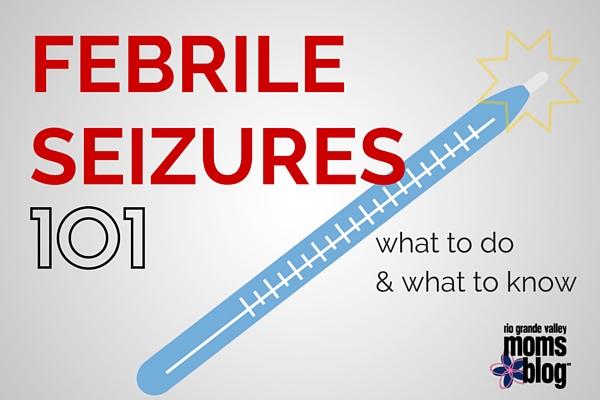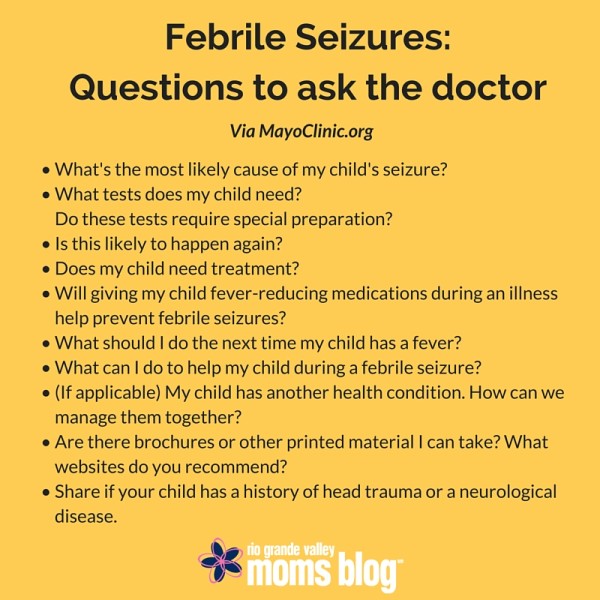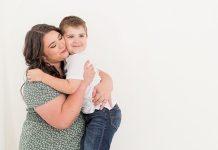Febrile Seizures. Those of you who know what they are typically do because you have either had one yourself or your little one has had one. Last week, our daughter’s school called to let us know she had a fever. On the way there I got another call saying she was fine but had had a minor seizure.
The only thought I had was that I needed to get to her and get her to the doctor ASAP. Luckily, they saw her immediately. The bottom line and cause: a virus. She was tested for Flu, RSV, Strep, blood tests, etc. and was negative for all. Still, we know she must have had a bad virus that caused a fever which caused the febrile seizure. Fortunately, these kinds of seizures are usually harmless and typically don’t indicate an ongoing problem.
In the past week, I’ve looked up some great resources online, and I want to share with anyone who may have gone through this or who might go through this. I want to preface this by saying that I’m not a doctor, and if your child had any kind of seizure please see the doctor immediately.
I found some great websites that list symptoms, when to see the doc, etc. Below are some great pointers from the Mayo Clinic. You can also check out KidsHealth, HealthyChildren.org, or find many more informative sites online.
Febrile Seizures: What are they?
According to healthychildren.org, a Febrile Seizure will occur in 3 or 4 out of 100 children ages 6 months to 5 years old. The Mayo Clinic Website defines febrile seizure as “a convulsion in a child that may be caused by a spike in body temperature, often from an infection…Febrile seizures represent a unique response of a child’s brain to fever, usually the first day of a fever.”
A Febrile Seizure may occur if your little one has a high fever (over 100.4F), they may lose consciousness, shake and/or jerk their arms around. Your kiddo may be acting normal, and then all of the sudden their body goes stiff, their arms and legs may shake, and their eyes may roll back. Typically, these don’t last longer than 60 seconds— but they can last up to 15 min.
There are two kinds of these guys:
- Simple febrile seizures. This more common type lasts from a few seconds to 15 minutes. Simple febrile seizures do not recur within a 24-hour period and are generalized, not specific to one part of the body.
- Complex febrile seizures. This type lasts longer than 15 minutes, occurs more than once within 24 hours, or is confined to one side of your child’s body.
Febrile seizures most often occur within 24 hours of the onset of a fever and can be the first sign that a child is ill. Usually, the fevers are triggered by a virus, but sometimes by a bacterial infection.
What are some other causes? The young age as mentioned above (between 6 months and 5 years) and a family history. Some children inherit a family’s tendency to have seizures with a fever. Additionally, researchers have linked several genes to a susceptibility to febrile seizures.
What to do if your baby has a seizure.
Some recommendations from the Mayo Clinic on what to do when your child has a seizure:
During the seizure:
- Don’t restrain your child, but do place him or her on a safe surface, such as the floor.
- Place your child on his or her side, keeping the face to the side and the lower arm extended under the head, to prevent your child from inhaling vomit if vomiting occurs.
- If your child had anything in his or her mouth when the seizure began, remove it to prevent choking. Don’t put anything in your child’s mouth during a seizure.
- Seek emergency care for a seizure that lasts longer than 10 minutes.
- Stay close to watch and comfort your child.
- Remove hard or sharp objects near your child.
- Loosen tight or restrictive clothing.
- Also – write down everything you remember – the length of time, the time of day, what medications they are on, etc. You are going to want to ask your doctor some questions, so write down anything you think of.
Questions to ask the doctor:
- What’s the most likely cause of my child’s seizure?
- What tests does my child need? Do these tests require special preparation?
- Is this likely to happen again?
- Does my child need treatment?
- Will giving my child fever-reducing medications during an illness help prevent febrile seizures?
- What should I do the next time my child has a fever?
- What can I do to help my child during a febrile seizure?
- (If applicable) My child has another health condition. How can we manage them together?
- Are there brochures or other printed material I can take? What websites do you recommend?
- Does your child have a history of head trauma or a neurological disease?
Your doctor will want to check for many different viruses and infections, and may do a blood and urine test. Quite possibly, a doctor may want to do a spinal tap to find out if your baby has an infection of the nervous system.
In come cases if the seizure is complex, and your doc may recommend an EEG or an MRI.
According to the research, a child is more likely to have a febrile seizure if their parents had them. I used to get seizures when I got a fever over 101, and my husband had one when he was younger as well. The doctors think that she had a very bad virus that caused her fever to spike.
I hope the research above and the information provided from the Mayo Clinic website and the other websites listed give some of you parents a good jumping off point for finding out more. Febrile seizures are scary. Personally, I felt as though I had no control — and I didn’t! But I am so glad my doctor saw her right away, glad I found all of these resources online, and especially glad that the day care took such good care of my little one. If you have gone through this, know you aren’t alone.















